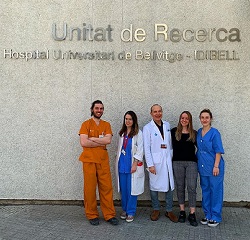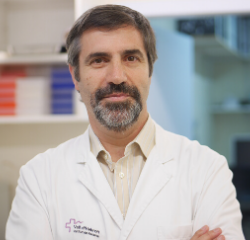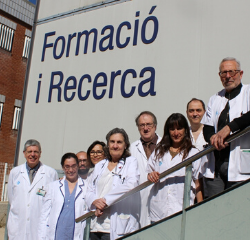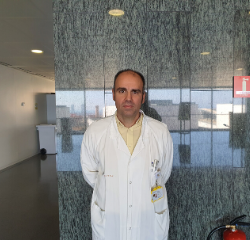6 ‘made in Catalonia’ Covid-19 prediction and prognosis methods
<p>Predicting and establishing the prognosis of diseases is key to controlling them. Biocat will provide support for the 19 research projects in the BioRegion awarded €4 million from the Catalan Ministry of Health to research the pandemic, 6 of which are looking into possible prediction or prognosis methods for this disease. Let’s look at how the centers are focusing their research.</p>

The Catalan Ministry of Health is funding 19 research projects at IRISCAT centers to prevent and treat the Covid-19 disease, chosen through an emergency call promoted by the Department of Research and Innovation (DGRIS), with collaboration from Biocat and the Agency for Health Quality and Assessment of Catalonia (AQuAS). Of these 19 projects, which will receive technical support from Biocat, 6 are working to discover new ways to predict and establish the prognosis of the disease, key to controlling it. Let’s look at their proposals:
Global database to set up a predictive model
Predictive models of serious cases of viral infection would allow doctors to classify Covid-19 patients to manage them properly, assessing whether they need to go to the hospital or stay home, and how they should be treated. Bonaventura Bolibar and Talita Duarte-Salles, of the Foundation University Institute for Primary Health Care Research Jordi Gol i Gurina (IDIAPJGol), in collaboration with the Catalan Institute of Health (ICS), propose developing  predictive models for complications in Covid-19 patients through two studies.
predictive models for complications in Covid-19 patients through two studies.
The first, carried out a few weeks ago using several international online databases, studied the behavior of similar viral infections in the past. They described the characteristics of people with complications from viral infections like the flu, evaluated predictors of adverse results among patients hospitalized with viral pneumonia, generated algorithms to identify the patients with the highest risk of complications and/or morbimortality, and assessed the safety of treatments used previously that could potentially be used to treat Covid-19.
The second study aims to describe the characteristics of people with Covid-19 in Catalonia and develop predictive models of Covid-19 complications using the methods and results of the first study. To do so, they will integrate information on Covid-19 patients in Catalonia, transform the new information with an international data model, and after comparing the data with databases in other countries, compile prognostic criteria applicable to policies to control the Covid-19 pandemic in our country.
“And how will we do all this? We will have to integrate all the information being collected on Covid-19,” explains researcher Bonaventura Bolibar, of IDIAPJGol. “We’re starting from the SIDIAP database we already have, with primary care information, which, along with PADIS and ICS, will progressively integrate other existing sources. And with this information, we will also work with databases from other countries, in America, Europe and Asia, that have information on Covid-19, which will allow us to obtain more solid, reliable results.”
Genetics of patients that develop ARDS
Determining the genetic profile of patients that develop Acute Respiratory Distress Syndrome (ARDS) is the goal of the project led by researcher Jordi Carratalà, of the Bellvitge Biomedical Research Institute (IDIBELL), with collaboration from the Hospital del Mar Research Institute (IMIM). The project hopes to determine the genetic profile of patients  hospitalized with Covid-19 by studying their genome to characterize the subgroup that develops ARDS and establish new guidelines to predict which patients will develop ARDS. The clinical study will be done at Bellvitge Hospital with 60 Covid-19 patients.
hospitalized with Covid-19 by studying their genome to characterize the subgroup that develops ARDS and establish new guidelines to predict which patients will develop ARDS. The clinical study will be done at Bellvitge Hospital with 60 Covid-19 patients.
The project, in addition to helping identify patients with the highest risk of developing ARDS, will be key in developing innovative therapies, preventive strategies and biomarkers, and for designing tools that can detect a patient’s level of risk and prognosis.
“The reason why some Covid-19 patients develop ARDS is still a mystery,” Carratalà says. “Our study poses the hypothesis that patients who develop these complications may have genetic characteristics (a transcriptome) that fosters it. So, our study will compare the transcriptome of Covid-19 patients who don’t develop these complications against that of those who do. If we show that there are several genetic characteristics that foster this complication, we could make a PCR technique to identify patients early and administer targeted anti-inflammatory treatments.”
The answers are in the virus’ genome
Sequencing the full SARS-CoV-2 genome using latest-generation techniques to get significant information on the characteristics of the virus, its natural evolution and its weaknesses: this is the main goal of the study led by Josep Quer at the Vall d’Hebron Research Institute (V HIR).
HIR).
The study has four main goals: first, to read the full SARS-CoV-2 genome using latest-generation sequencing technology. This procedure could adapt to other emergency situations potentially caused by other infectious agents in the future. Second, to study the genetic diversity of viruses isolated from patients with serious and mild cases of Covid-19 to identify viral factors associated with its virulence. Third, to identify differences between viral genomes isolated from the upper and lower respiratory tracts, which could determine the viral diversity of SARS-CoV-2 inside the host and its ability to spread. And, fourth, to identify highly conserved regions of the virus’ genome (which are those we should attempt to attack).
“The first goal of the study is to sequence the full genome and do an epidemiological study, which will allow us to compare with sequences from other places (epidemiological study), but also to monitor any future outbreaks (vigilance study). The second has to do with studies comparing the virus isolated from patients with serious and mild cases of the disease. The third hopes to study the virus isolated from the upper respiratory tract compared to the virus isolated from the lower respiratory tract to see whether there is a difference in the virus population, and the fourth has to do with variability studies that allow us to detect which are the variables where the virus can generate resistance to antivirals and also study the areas of the virus that never change and can therefore be targets for designing direct-action antiviral drugs and vaccines,” explains Josep Quer.
Immune response, another path for studying the disease
Study on the immune response of healthcare professionals infected with SARS-CoV-2 to understand the infection in a specific area, identify individuals with good immunological response and study acquired immunity over a year. These are the goals of the research being done by Pere Torán and Concepció Violan at the Foundation University Institute for Primary Health Care Research Jordi Gol i Gurina (IDIAPJGol). The project is being carried out in collaboration with the Institute for Health Science Research Germans Trias i Pujol (IGTP).
The study aims to describe a group of hea lthcare professionals exposed to SARS-CoV-2 by measuring serological and immunological characteristics that can differentiate between symptomatic and asymptomatic carriers. Plus, the study hopes to identify how long immunity to SARS-CoV-2 lasts, how long an asymptomatic carrier is contagious and the factors that predict asymptomatic carriers. It also seeks to establish an algorithm to identify carriers and immune response (semi-quantitative) based on results obtained from studying samples from the individuals in the study. Finally, the project aims to identify the cytokines in the initial phase of Covid-19 that could be used as biomarkers or trackers of the progression and severity of the disease.
lthcare professionals exposed to SARS-CoV-2 by measuring serological and immunological characteristics that can differentiate between symptomatic and asymptomatic carriers. Plus, the study hopes to identify how long immunity to SARS-CoV-2 lasts, how long an asymptomatic carrier is contagious and the factors that predict asymptomatic carriers. It also seeks to establish an algorithm to identify carriers and immune response (semi-quantitative) based on results obtained from studying samples from the individuals in the study. Finally, the project aims to identify the cytokines in the initial phase of Covid-19 that could be used as biomarkers or trackers of the progression and severity of the disease.
“We hope the results give us information on how long patients remain immune (this is very important to prepare for subsequent waves of the pandemic). We also hope to characterize the asymptomatic carrier and identify progression biomarkers of the severity of the disease. We hope to see results in 6 months to a year,” says Torán.
So, the results will help optimize management of human resources based on solid criteria to ensure the safety of professionals and patients, bolstering the healthcare system to tackle the pandemic and future waves of the disease that are expected to come.
Prognostic biomarkers for the disease: the key
Finding prognostic biomarkers for the disease is another key way to control it. Francesc Vidal Marsal, of the Pere Virgili Institute (IISPV), is leading a mass study of the blood properties of Covid-19 patients to find prognostic biomarkers for the disease.
 The project aims to improve knowledge of the immunopathology of serious SARS-CoV-2 infection and the patient’s immune response, to find early prognostic biomarkers of SARS-CoV-2 infection that can predict the severity of Covid-19, and to study potential therapeutic targets to improve the patient’s immune response to the infection.
The project aims to improve knowledge of the immunopathology of serious SARS-CoV-2 infection and the patient’s immune response, to find early prognostic biomarkers of SARS-CoV-2 infection that can predict the severity of Covid-19, and to study potential therapeutic targets to improve the patient’s immune response to the infection.
How? Researchers will look for early prognosis biomarkers for Covid-19 with a multi-omic approach (proteomic, metabolomic and lipidomic analyses) using blood samples and specific cells closely associated with viral infection (white blood cells) from patients and healthcare professionals with Covid-19. Patients infected with SARS-CoV-2 will be grouped into two clinical stages: during the acute response phase (base) and after 4 weeks of evolution, to observe the differences.
The study will be conducted with an open number of people who have tested positive for SARS-CoV-2 at Joan XXIII University Hospital in Tarragona.
Predicting respiratory failure is possible
There aren’t any biomarkers currently that can identify which Covid-19 patients will experience respiratory failure. The study led by researcher Ivan Castellví, of the Research Institute of the Hospital de la Santa Creu i Sant Pau (IR Sant Pau), will assess blood levels of a protein (KL-6) to predict the development of serious respiratory failure in patients with respiratory conditions associated with Covid-19.
The results of this study will have a direct impact on hospitalization policies, and could help classify the risk of Covid-19 patients in the early stages of the disease, both for those who have a low risk of worsening respiratory conditions and those whose condition may worsen while in the hospital.
impact on hospitalization policies, and could help classify the risk of Covid-19 patients in the early stages of the disease, both for those who have a low risk of worsening respiratory conditions and those whose condition may worsen while in the hospital.
“One of the complications of the novel coronavirus infection in many patients is lung damage, but we don’t know exactly who will develop serious respiratory failure after being hospitalized. The aim of our study in determining KL-6 in the early phases of lung damage caused by the disease is to predict which patients will develop severe respiratory failure or have a greater need for oxygen while hospitalized, so we can better classify these patients and provide optimal therapeutic alternatives, pharmacological and non-pharmacological,” explains Castellví.


